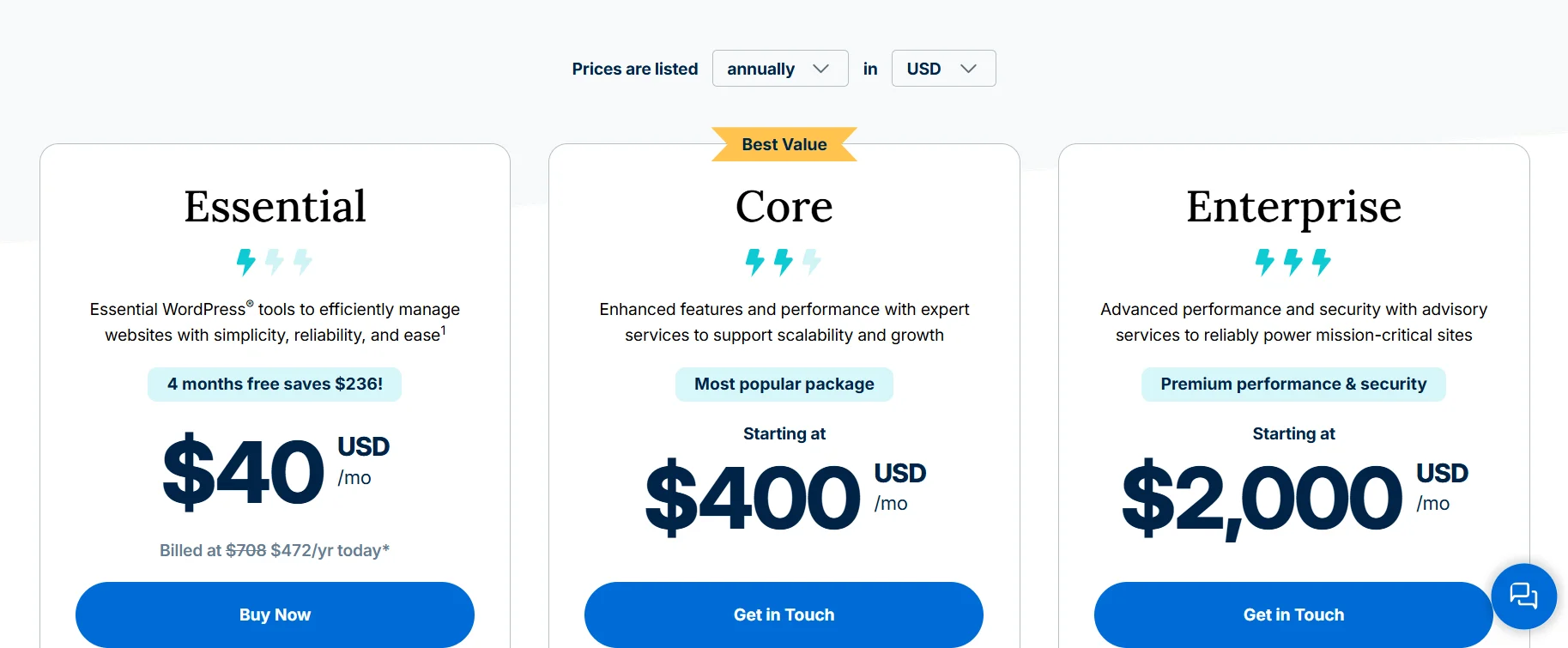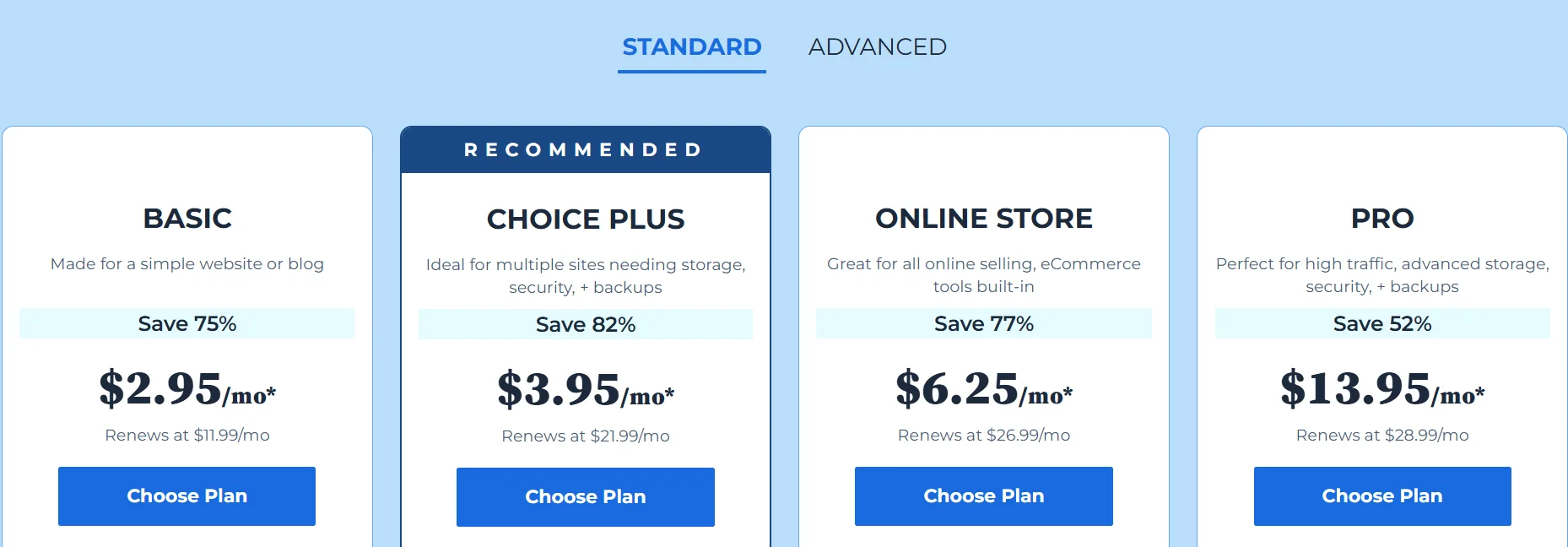
WP EngineLearn More |

BluehostLearn More |
|---|---|
| $ Pricing | 40 | 2.95 |
| Best for |
WP Engine is a premium managed hosting provider designed specifically for WordPress websites, offering top-tier performance and security. |
Bluehost is an affordable web hosting provider offering beginner-friendly WordPress hosting and other hosting services. |
| Features |
|
|
| Pros | |
|
|
| Cons | |
|
|
Looking for the right hosting service for your website?
Hosting a website can be challenging, and finding a reliable web hosting provider is even harder. Whether you run an eCommerce store or a personal blog, picking the right host is crucial because it connects your site to internet servers. If you’re running a small to medium-sized WordPress blog, you’ll find plenty of great hosting options out there.
However, with so many choices available online, figuring out which hosting service is the best fit for your website can be overwhelming. It’s important to remember that not every web host is suitable for all websites—different sites have different needs!
If you’re searching for a powerful and reliable hosting service for your WordPress site, we’ve got you covered. Let’s compare two of the most popular options in the industry: WP Engine and Bluehost!
WP Engine vs Bluehost ( In-Depth Comparison)
About WP Engine
WP Engine is a premium web hosting platform designed specifically for WordPress websites. Known for its speed, reliability, and cutting-edge features, WP Engine focuses on providing managed hosting solutions to help businesses, bloggers, and developers get the best performance out of their WordPress sites.
With tools like automatic updates, daily backups, and advanced security, WP Engine takes the technical work off your plate, letting you focus on creating great content.
It’s perfect for those who prioritize performance and don’t mind paying a little extra for top-tier service.
About Bluehost
Bluehost is one of the most widely recognized web hosting providers. It offers beginner-friendly services for creating websites. WordPress.org officially recommends it, making it an excellent choice for WordPress users.
Bluehost is known for its affordability, easy-to-use interface, and a range of hosting options that cater to everyone—from small blogs to larger business sites.
With features like a free domain for the first year, 24/7 support, and a simple setup process, Bluehost is ideal for those just starting their online journey or anyone seeking a dependable hosting solution.
The company provides millions of users around the world with robust resources so everyone, beginner or experienced, can access the web and succeed with their web hosting packages.
Features: Who can do more?
Managed WordPress hosting is an area that WP Engine specializes in. But while comparing, Bluehost comes out on top, offering a broader range of services including shared and dedicated hosting, as well as private virtual servers (VPSs). They also provide daily hosting plans for WordPress, which they operate themselves.
In this article, we’ll concentrate on the daily WordPress hosting plans for Bluehost, so we can help you determine if controlled hosting is worth the extra cost.
WP Engine
- Basic plan supports one website
- Staging and production environments
- Nightly automated backups
- 24/7 support via chat (more options available for higher plans)
- Integrated content delivery network (CDN)
- Secure your site with free automatic SSL certificates
- Green padlock
- Includes free Genesis Framework, including over 35 Genesis child themes
- Multiple add-ons are available for all plans
Bluehost
- The basic plan supports one website with its A plan
- Unlimited plans support multiple websites
- Free domain for one year
- 50 GB SSD storage
- Unlimited storage and bandwidth for higher tiers
- Automatic WordPress installation and updates
- All plans come with staging functionality
- Free SSL certificate
- 24/7 support via chat
It should not surprise you that the shared hosting offered by Bluehost does not deliver as much by default as the WP Engine, considering the price difference. Bluehost does offer staging features, though, which is something you almost never see among WordPress hosts on a budget. Plus, as part of the contract, it throws in free domain registration, which might seal the deal for you compared to WP Engine.
Ease of use: Which one’s easier to use?
Bluehost provides one of the most user-friendly solutions available as far as hosting panels go. Your Bluehost panel is amazingly easy to navigate, and with a single click, you can easily access your WordPress websites. It’s also worth noting that while Bluehost does install WordPress for you, it doesn’t allow you to move your site. This means that if you have a website that you want to switch to a joint plan for Bluehost, you are on your own unless you opt for the $149.99 Site Transfer package.
WP Engine does not offer human migrations either, but it does give you a dedicated plugin that automates most of the process. This is a small drawback, given that many other WordPress-controlled hosts are generally happy to handle migrations for you.
Going forward, the WP Engine interface will not be as smooth as its equivalent to Bluehost. That’s to be expected, given that you have access to more advanced apps. However, you couldn’t make it challenging to manage.
Ultimately, WP Engine offers many more options out of the box to micromanage the website via its hosting panel. Of course, it’s a positive thing, but it does mean that there is a higher learning curve. Overall, once you sign up for a contract, WP Engine has an advantage when it comes to features, and if you have experience in managing, it is a better match.h
Performance: Which web host performs better?
Typically, the biggest differences in functionality and output between managed and shared WordPress hosts lie. We have already compared the former to WP Engine vs Bluehost, so let’s think about the latter.
WP Engine offers an integrated CDN out of the box and boasts fast loading times as one of its key selling points. With that in mind, we went to the exam with high hopes.
To begin with, we set up two identical websites, one for each web host. We installed the Twenty Nineteen theme, loaded it with Test Data for the WordPress Theme Device, and enabled an identical set of common plugins (Yoast, Wordfence, Jetpack, and Communication Type 7).
We tried to simulate a real-world website to verify the results. We used Pingdom Software for the tests and averaged three tests at five server locations. The results we obtained were as follows:
Bluehost
- Washington, D.C.: 5.11 seconds
- San Francisco: 2.24 seconds
- London: 3.13 seconds
- Sydney: 3.63 seconds
- Tokyo: 2.70 seconds
WP Engine
- Washington, D.C.: 648 ms
- San Francisco: 430 ms
- London: 989 ms
- Sydney: 1.17 seconds
- Tokyo: 763 ms
The results speak for themselves when it comes to efficiency. WP Engine takes a commanding lead. On the other hand, Bluehost drops the ball significantly, particularly when you consider the price difference between the two hosts.
As a rule, you don’t want websites to take longer than two seconds to load, no matter how complicated they might be. The test websites we set up were amazingly straightforward, and under no circumstances could they take up to five seconds to load.
Apart from loading times, you do want to ensure that the uptime of your web host is as near as possible to perfection. Bluehost and WP Engine rated 100 percent in this field.d
Performance and efficiency are critical for every website. Because both web hosts get perfect scores when it comes to uptime, it all depends on loading times. As such, WP Engine does manage to get the upper hand over Bluehost!
Customer Support: Who serves you better?
Bluehost and WP Engine also have knowledge bases that anyone can access to their platform for instant support. WP Engine is much more in-depth, however, and it contains hundreds of support papers for WordPress users.
For our WordPress hosting survey, we polled hundreds of users every year. We call on users to rate the support level for all the big WordPress hosts. Here’s what Bluehost and WP Engine had to say about them:
- WP Engine’s overall support rating: 4.69/5
- Bluehost’s overall support rating: 3.42/5
Generally, users find that WP Engine workers are well prepared to deal with WordPress-specific problems. This may not be surprising, considering WP Engine’s entire business is based around WordPress, while Bluehost provides many other hosting plans.
Price: Which web host is value for money?
WP Engine vs. Bluehost Testimonials
WPEngine
BlueHost
Which web host should you choose?
For most people, the decision between controlled and shared WordPress hosting is down to price. In most cases, you know, controlled hosting is better across the board, but the question is whether you really need all the additional functionality and the WP Engine firepower offerings.
If you want to set up a personal website or a small project, you don’t expect to get a lot of traffic. The decision is clear: paying $30 a month for hosting is not cost-effective, and it’s probably overkill for your project.
Quick Links:
- Bluehost vs Liquid Web Comparison
- HostGator vs Wp Engine: Which Is Better at Hosting?
- The Beginner& Guide To Web Hosting In 2020 (UPDATED)
- WP Engine Coupon Codes : Get (20% Off + 2 Months Free)
Conclusion! WP Engine vs BlueHost 2025 | Which One To Choose?
On the other hand, WP Engine, while more expensive, offers a wealth of advanced functionality and lightning-fast performance. If your budget allows and you need top-tier features, WP Engine’s managed hosting plans are an excellent investment for your website.














